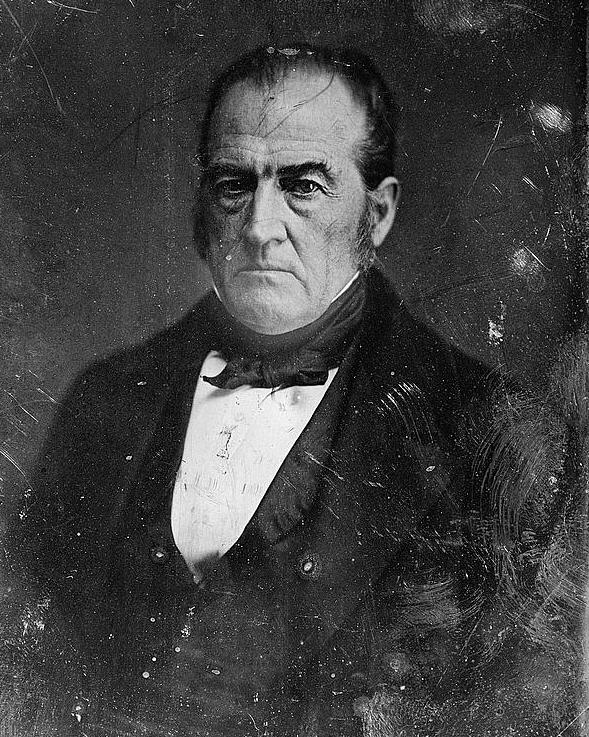- John Bell (Tennessee politician)
Infobox Officeholder
name =John Bell

imagesize =200px
small
caption =
order =16th
office =Speaker of the United States House of Representatives
term_start =June 2 ,1834
term_end =March 4 ,1835
president =Andrew Jackson
predecessor =Andrew Stevenson
successor =James K. Polk
order2 =Member of the U.S. House of Representatives fromTennessee 's 7th district
term_start2 =March 4 ,1827
term_end2 =March 3 ,1841
predecessor2 =Sam Houston
successor2 =Robert L. Caruthers
order3 =16thUnited States Secretary of War
term_start3 =March 5 ,1841
term_end3 =September 13 ,1841
president3 =William Henry Harrison John Tyler
predecessor3 =Joel R. Poinsett
successor3 =John C. Spencer
order4 =United States Senator fromTennessee
term_start4 =November 22 ,1847
term_end4 =March 3 ,1859
predecessor4 =Spencer Jarnagin
successor4 =Alfred O. P. Nicholson
birth_date =February 15 ,1797
birth_place =Nashville, Tennessee
death_date =September 10 ,1869 (aged 72)
death_place =Dickson County, Tennessee
nationality =
party =Democratic-Republican Democratic National Republican Whig American Constitutional Union
otherparty =
spouse =Sally Dickinson Bell Jane Yeatman Bell
relations =
children =
residence =
alma_mater =Cumberland College
occupation =
profession =Law
net worth =
religion =
website =
footnotes =John Bell (also known as "The Great Apostate")Fact|date=August 2008 (
February 15 ,1797 –September 10 ,1869 ) was a U.S.politician , attorney, andplantation owner. A wealthy slaveholder fromTennessee , Bell served in theUnited States Congress in both the House of Representatives and Senate. He began his career as a Democrat, he eventually fell out withAndrew Jackson and became a Whig. In 1860, he was among a group of Presidential candidates defeated byAbraham Lincoln in a bitterly divided election that helped spark theAmerican Civil War .Early life and career
Bell was born in Mill Creek, a hamlet near
Nashville, Tennessee . He was the son of local farmer Samuel Bell and Margaret (Edmiston) Bell. His father was a blacksmith and farmer. He graduated fromCumberland University in 1814 and studied law. He was admitted to the bar in 1816 and established a prosperous practice in Franklin. Entering politics, he successfully ran for the Tennessee State Senate in 1817. After serving a single term, Bell declined to run for reelection and instead moved to Nashville. He was elected to theTwentieth United States Congress in 1826, defeatingFelix Grundy , who had the support of presidential candidate Andrew Jackson.He served Tennessee's 9th Congressional District in the U.S. House of Representatives from 1827 to 1841. At first a strong supporter of Andrew Jackson, Bell broke with the Jacksonian Democrats in the fight over the controversial
Bank of the United States . He served as Speaker of the House from 1834 to 1835. He was defeated for the post several other times by his rival,James K. Polk , a fellow Tennessee Congressman. Bell also served several terms as the chairman of the Committee on Indian Affairs and served on the Committee on Judiciary.Bell then served briefly as Secretary of War under
William Henry Harrison andJohn Tyler in 1841, but then resigned along with the rest of the Cabinet in protest at Tyler's vetoes of Whig bills. He returned to Tennessee and invested in railroads and manufacturing interests, while politically opposing Polk, who won the presidency in 1844 but failed to carry Tennessee through Bell's efforts. In 1847, Bell returned to local politics, being elected to the State House of Representatives. His majority Whig Party selected him for theUnited States Senate , where he served until 1859. A reluctant supporter of theCompromise of 1850 , Bell was only one of two Southern senators (the other beingSam Houston ofTexas ) to vote against theKansas-Nebraska Act .Bell married twice, first to Sally Dickinson and then to Jane Yeatman after Dickinson's death.
Presidential candidacy
After the collapse of the Whig Party in the 1850s, Bell was among the leaders of the small group (mostly border state and middle state Whigs) who attempted to preserve the Whig Party in another form, and became the Presidential candidate of the
United States Constitutional Union Party . The way many people viewed the Constitutional Union Party, unfortunately, was that it was a desperate attempt to save the collapsing Whig Party. The moderate party was formed from a group of southern Whigs who joined with nativists from border states likeTennessee .Abraham Lincoln of the Republican Party won theUnited States Presidential election of 1860 in the face of a four-way split of the votes. Bell won 39 electoral votes (13%) and 592,906 popular votes (13% of the total; 39% of Southern popular votes (Lincoln was not on the ballot in several southern states). Bell carriedVirginia ,Kentucky , andTennessee , largely as a result of the division of Democratic votes betweenJohn C. Breckenridge (Democratic candidate representing the South) andStephen A. Douglas (representing theNorthern United States ), but received less than 3% of the vote in Northern states.Later life
Initially opposed to
secession , he travelled toWashington D.C. to meet with President Lincoln. Bell was initially successful in helping hold Tennessee in the Union after states in the Deep South seceded. However, after the firing onFort Sumter inSouth Carolina and Lincoln's call for military troops to force the secessionist states back into the Union, Bell reluctantly accepted Tennessee's subsequent secession and retired from politics, his spirit broken and in ill health. He joined a group of investors in saltworks and ironworks, purchasing a shared interest in the Cumberland Furnace nearCharlotte, Tennessee . However, most of his businesses were severely damaged or ruined during the Civil War. In 1869 Bell died at his home on the banks of theCumberland River , near the Cumberland Furnace not far fromDover, Tennessee . He was buried in Nashville's Mt. Olivet Cemetery.His son-in-law was Confederate Congressman
Edwin Augustus Keebel .External links
*findagrave|6653388 Retrieved on
2008-08-10
* [http://www.archive.org/details/pubrecordpasthist00everrich "The public record and past history of John Bell & Edward Everett"]
Wikimedia Foundation. 2010.
